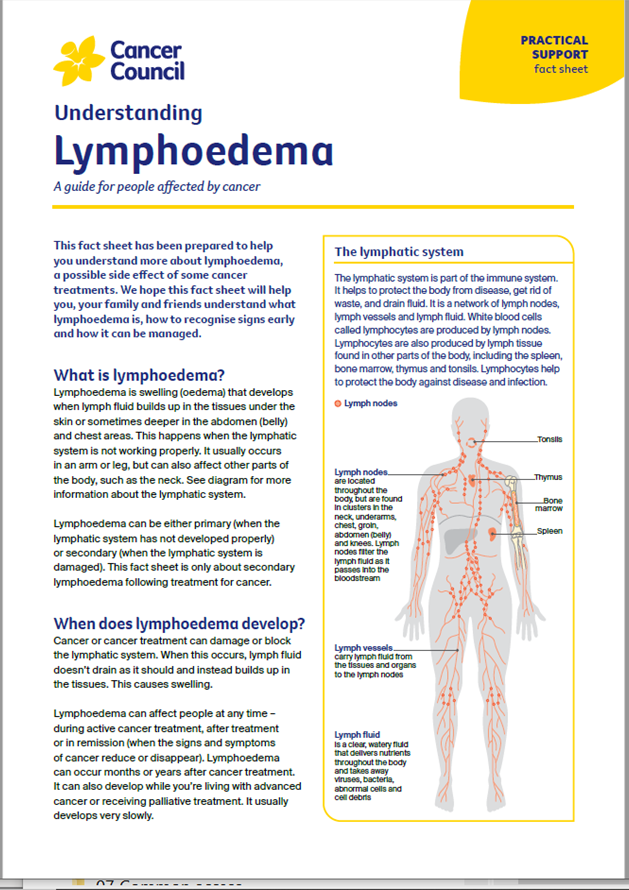- Home
- Cancer Information
- Cancer treatment
- Radiation therapy
- Managing radiation therapy side effects
- Lymphoedema
Lymphoedema
Lymphoedema is swelling that occurs in soft tissue. If lymph nodes or lymph vessels have been damaged during radiation therapy, lymph fluid may not drain properly. If lymph fluid builds up, it can cause swelling in the area being treated. Lymphoedema usually occurs in an arm or leg, but can also affect other parts of the body. The main signs of lymphoedema include swelling, redness and skin warmth, which may come and go.
People who have had surgery followed by radiation therapy are more at risk. Lymphoedema or swelling is sometimes just a temporary effect of radiation therapy, but it can be ongoing. It can also be a late effect, appearing months or even years after treatment.
Ways to manage lymphoedema
Lymphoedema is easier to manage if the condition is treated early. Treatment will aim to improve the flow of lymph fluid.
- Avoid pressure, injury or infection to the affected part of your body, and to see your doctor if you have any signs of lymphoedema.
- See a specialist physiotherapist who can teach you simple exercises to reduce your risk of developing lymphoedema or show you ways to manage it if you have developed it. Some hospitals have specialist physiotherapists. There are also outpatient and private lymphoedema practitioners.
- Lymphoedema practitioners can develop a personalised treatment program. This may include exercises, skin care, lymphatic drainage massage and compression garments, if needed.
- To find a lymphoedema practitioner, visit the Australasian Lymphology Association and select “Find a Practitioner”.
For more on this, see Lymphoedema, or call Cancer Council 13 11 20.
Podcast: Coping with a Cancer Diagnosis
Listen to more of our podcast for people affected by cancer
More resources
Prof June Corry, Radiation Oncologist, GenesisCare, St Vincent’s Hospital, VIC; Prof Bryan Burmeister, Senior Radiation Oncologist, GenesisCare Fraser Coast, Hervey Bay Hospital, and The University of Queensland, QLD; Sandra Donaldson, 13 11 20 Consultant, Cancer Council WA; Jane Freeman, Accredited Practising Dietitian (Cancer specialist), Canutrition, NSW; Sinead Hanley, Consumer; David Jolly, Senior Medical Physicist, Icon Cancer Centre Richmond, VIC; Christine Kitto, Consumer; A/Prof Grace Kong, Nuclear Medicine Physician, Peter MacCallum Cancer Centre, VIC; A/Prof Sasha Senthi, Radiation Oncologist, The Alfred Hospital and Monash University, VIC; John Spurr, Consumer; Chris Twyford, Clinical Nurse Consultant, Radiation Oncology, Cancer Rapid Assessment Unit and Outpatients, Canberra Hospital, ACT; Gabrielle Vigar, Nurse Unit Manager, Radiation Oncology/Cancer Outpatients, Cancer Program, Royal Adelaide Hospital, SA.
View the Cancer Council NSW editorial policy.
View all publications or call 13 11 20 for free printed copies.
Need to talk?
Support services
Looking for transport, accommodation or home help?
Practical advice and support during and after treatment
Work and cancer
Information for employees, employers and workplaces dealing with cancer
Cancer information
Massage
Learn more about how some types of massage can reduce lymphoedema
Exercise during cancer
Exercise helps most people during cancer treatment. Find out which exercises are best for you, and watch our series of exercise videos

